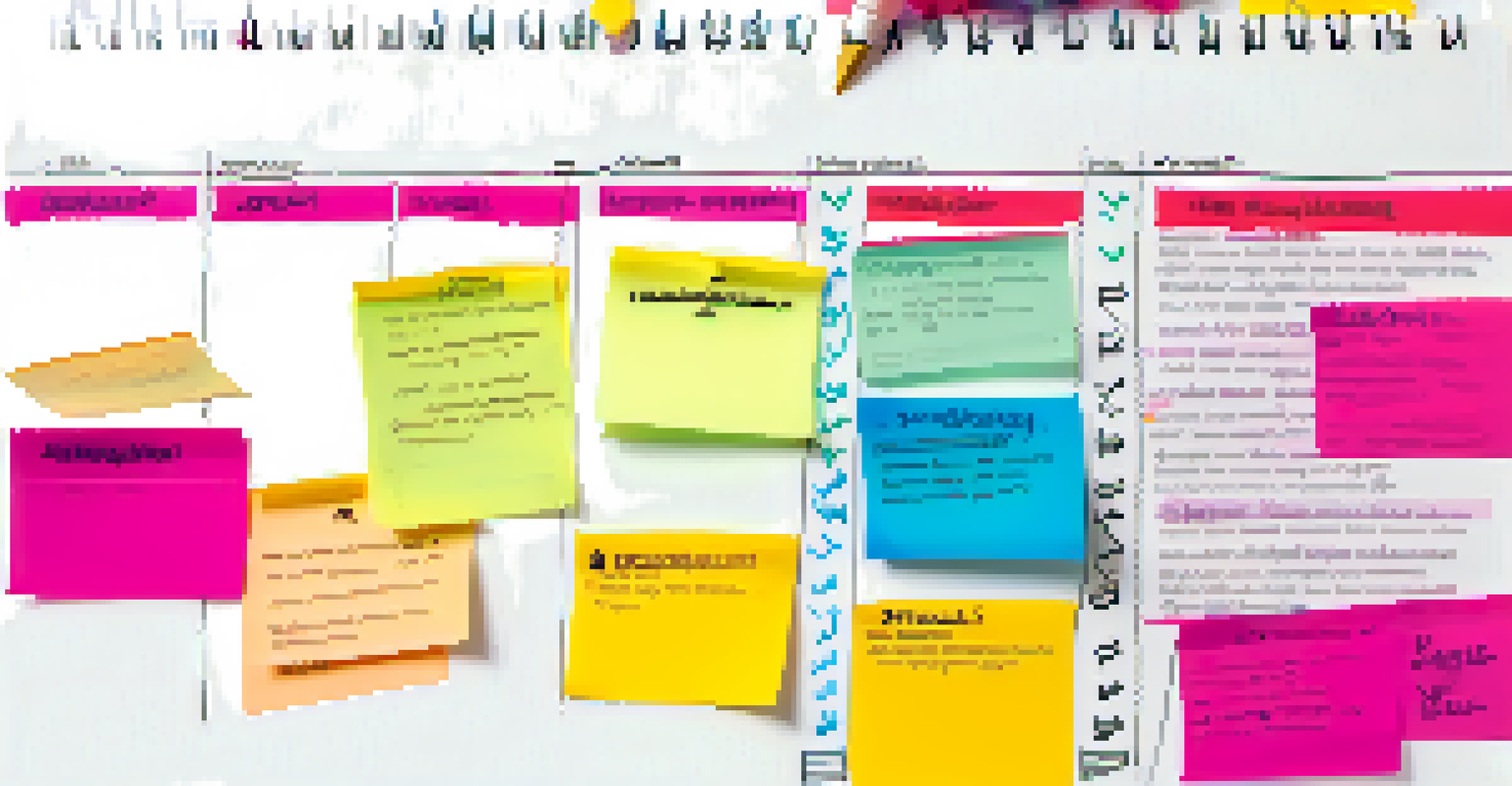Creating a Personalized Technical Skills Development Plan

Understanding the Importance of a Skills Development Plan
A personalized technical skills development plan is essential for anyone looking to advance in their career. It serves as a roadmap, helping you identify the skills you need to acquire or improve upon. This is particularly crucial in the fast-paced tech industry, where new tools and technologies emerge regularly.
An investment in knowledge pays the best interest.
By having a clear plan, you can focus on the areas that will provide the most value to your career path. This not only makes your learning process more efficient but also boosts your confidence as you track your progress. Think of it as a GPS for your career journey, ensuring you stay on the right track.
Moreover, a well-structured skills development plan can help you stand out in a competitive job market. Employers often look for candidates who demonstrate initiative and a commitment to continuous learning, making your plan an integral part of your professional identity.
Assessing Your Current Skill Level and Needs
Before you can create an effective development plan, you need to assess your current skill level. This involves honestly evaluating your strengths and weaknesses in relation to your career goals. Consider using self-assessment tools or seeking feedback from peers or mentors to gain a clearer picture.

Once you've identified your starting point, think about the skills required for your desired role or advancement. This might involve researching job descriptions or speaking with professionals in your field. By understanding the landscape, you can pinpoint specific gaps in your knowledge that need addressing.
Importance of a Skills Plan
A personalized skills development plan acts as a roadmap for career advancement, helping you focus on necessary skills and stand out in the job market.
As you assess your skills, don't forget to consider both technical and soft skills. While technical skills are crucial for many roles, soft skills like communication and teamwork are equally important. A balanced approach will help you become a more well-rounded professional.
Setting Clear, Achievable Goals for Skill Development
Goal setting is a critical step in any personalized skills development plan. Make your goals SMART: Specific, Measurable, Achievable, Relevant, and Time-bound. For example, instead of saying, 'I want to learn programming,' a SMART goal would be, 'I will complete an online Python course by the end of next month.'
The only way to do great work is to love what you do.
Having clear goals not only gives you direction but also allows you to measure your progress along the way. Celebrate small wins to keep your motivation high. Each completed milestone brings you closer to your overarching objective and reinforces your commitment to learning.
Additionally, make sure your goals align with your long-term career aspirations. This connection will help you stay engaged and invested in your development journey. Remember, the more relevant your goals are, the more likely you are to stay focused and achieve them.
Choosing the Right Learning Resources and Methods
With your goals in place, it's time to explore the various learning resources available to you. Options abound, from online courses and tutorials to workshops and mentorship programs. Consider your preferred learning style; some people thrive in structured environments, while others prefer self-paced learning.
Don't hesitate to combine different methods for a well-rounded approach. For instance, you might take an online course for foundational knowledge, then apply what you've learned through hands-on projects. This blend of theory and practice can reinforce your skills and deepen your understanding.
Setting SMART Goals
Establishing clear, SMART goals ensures you have direction and measurable progress in your skills development journey.
Moreover, seek out resources that are reputable and relevant to your field. Platforms like Coursera, Udemy, and LinkedIn Learning offer a plethora of courses across various technical disciplines. Reading industry blogs or joining professional networks can also provide valuable insights and updates on emerging trends.
Creating a Timeline for Your Skills Development Journey
A timeline is essential for keeping your skills development plan on track. Break down your goals into smaller tasks, and assign realistic deadlines for each. This structured approach helps you avoid feeling overwhelmed and makes the learning process more manageable.
Consider using project management tools like Trello or Asana to visualize your progress and deadlines. Seeing your tasks laid out can provide motivation and clarity on what needs to be done next. It’s like having a personal coach guiding you through your development journey.
As you work through your timeline, be flexible and willing to adjust as needed. Life can be unpredictable, and sometimes you may need to shift your focus or extend deadlines. The key is to remain committed to your growth while being adaptable to changes.
Monitoring Progress and Adjusting Your Plan as Needed
Regularly monitoring your progress is crucial to ensure you're on track to meet your goals. Schedule check-ins with yourself to evaluate what you've learned and how far you've come. This reflection can help you identify areas where you might need to invest more time or seek additional resources.
Don’t be afraid to adjust your plan if you find certain strategies aren’t working. Learning is a dynamic process, and it’s important to remain open to change. Whether it’s modifying your goals or trying different learning methods, flexibility can lead to more effective outcomes.
Monitoring and Flexibility
Regularly monitoring your progress and being open to adjusting your plan is crucial for effective learning and personal growth.
Additionally, consider seeking feedback from mentors or peers. They can provide insights on your development and suggest areas for improvement. This collaborative approach can enhance your learning experience and keep you motivated on your journey.
Staying Motivated and Committed to Your Development Plan
Staying motivated throughout your skills development journey can sometimes be challenging. To combat this, remind yourself of the reasons you set your goals in the first place. Visualizing the end result—whether it's a new job, promotion, or project—can reignite your passion and commitment.
Also, consider finding an accountability partner or joining a study group. Sharing your journey with others can provide encouragement and support, making the process more enjoyable. Plus, discussing challenges and successes with peers can spark new ideas and insights.

Lastly, don’t forget to reward yourself for your achievements. Whether it’s treating yourself to a nice meal or taking a break to enjoy a hobby, celebrating milestones can boost your motivation and reinforce the positive impact of your hard work.